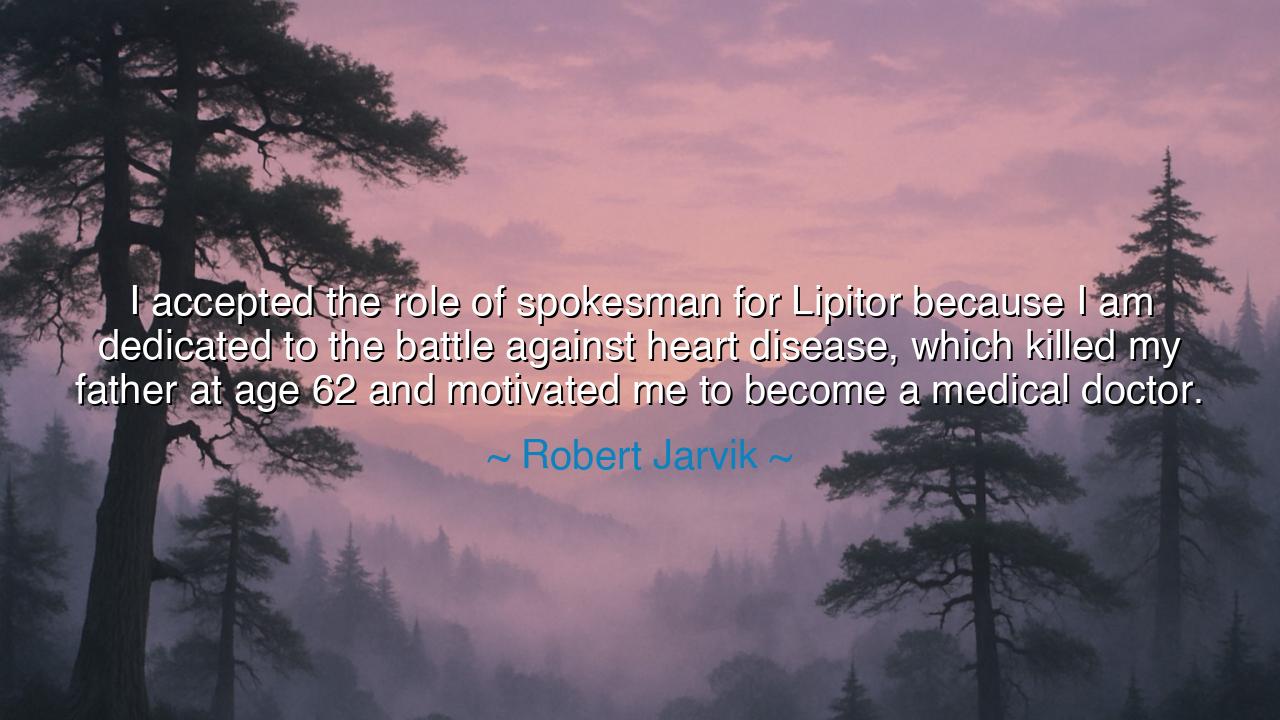
I accepted the role of spokesman for Lipitor because I am
I accepted the role of spokesman for Lipitor because I am dedicated to the battle against heart disease, which killed my father at age 62 and motivated me to become a medical doctor.






“I accepted the role of spokesman for Lipitor because I am dedicated to the battle against heart disease, which killed my father at age 62 and motivated me to become a medical doctor.” Thus spoke Dr. Robert Jarvik, a man whose name became known not for wealth or fame, but for his service to the human heart — both in flesh and in spirit. These words are not a mere declaration of professional duty; they are a vow, born from loss, love, and purpose. Behind them lies a truth as old as humankind: that suffering, when met with courage and conviction, can become the forge of destiny.
Dr. Jarvik’s father’s death was no abstract statistic, but a wound that struck the son’s soul and reshaped his path. Where others might have been crushed by grief, Jarvik transformed it into resolve. The death of his father did not end a story — it began one. It lit within him the fire of dedication, a commitment to fight the very disease that had taken the man who gave him life. Thus, through sorrow, he found calling, as so many before him have done. His words remind us that purpose is often born in pain — that the heart, once broken, can learn to heal the world.
In his quote, Jarvik speaks not merely of a personal journey, but of a great and ongoing battle — the battle against heart disease. To him, this struggle is not waged in laboratories alone, but in the choices of every human being: in how we live, how we care for our bodies, and how we use knowledge to preserve life. By becoming a spokesman for Lipitor, he did not simply endorse a medicine; he sought to awaken awareness — to bring light to the shadow that still claims millions. For in his eyes, medicine is not commerce but compassion, not a business of profit but a covenant of care.
Robert Jarvik, as the creator of the artificial heart, stands in the lineage of the great healers of history — those who looked upon the suffering of humankind and said, “There must be a way.” Like Hippocrates, who swore his oath to do no harm, or Louis Pasteur, who brought hope through science, Jarvik turned innovation into mercy. Yet unlike those who work only from curiosity, he worked from grief. The heart that he built from metal and plastic was not just a machine — it was a tribute, an offering to the father who could not be saved. His life became a testament that the greatest discoveries are not born from ambition, but from love made immortal through purpose.
Throughout history, this transformation of pain into passion has guided humanity’s noblest souls. When Florence Nightingale saw soldiers dying by the hundreds, she turned anguish into a revolution of nursing. When Jonas Salk saw the cruelty of polio, he created the vaccine that freed generations from its grasp. So too did Robert Jarvik look into the face of loss and answer not with despair, but with invention. His father’s death became a teacher; his grief, the mentor that guided his every act. From sorrow, he carved meaning — and through that meaning, he gave hope to others who still fight the same unseen war.
There is also in his words a lesson about integrity and authenticity. Jarvik did not lend his name to a cause he did not believe in. He did not speak as a salesman, but as a son. His voice carried the weight of personal truth. He respected the power of medicine, but more than that, he respected the sacred trust between doctor and patient, between healer and healed. In a world where motives often blur, his declaration stands as a reminder that true advocacy comes from sincerity, not from ambition. When one’s work is guided by love and memory, it transcends all doubt.
So, my children, let us draw wisdom from these words. Dedication is born where pain meets purpose. Do not flee from the wounds life gives you; transform them. When you lose someone you love, let their memory ignite your calling. When you see suffering, let it move you to act. Whatever your craft — be it medicine, art, teaching, or service — let compassion guide your hands. For in doing so, you join the great lineage of those who turn heartbreak into healing.
And remember this final truth from Robert Jarvik’s life and words: to respect life is to fight for it, in every way you can. Do your work with passion. Honor those who came before you by protecting those who live now. Let your pain become your teacher, and your purpose, your legacy. For in the end, as Jarvik shows us, the heart can break, yet still build — and in building, it lives forever.






AAdministratorAdministrator
Welcome, honored guests. Please leave a comment, we will respond soon